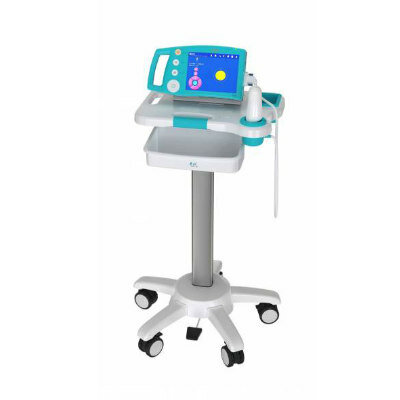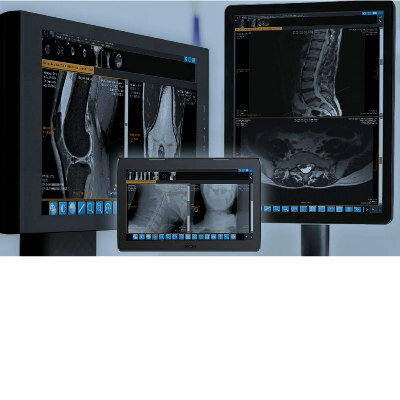AI Platform Analyzes Data from Prostate Imaging, Biopsies and Pathology to Identify Tumor Location
|
By MedImaging International staff writers Posted on 01 May 2023 |

One in eight men will develop prostate cancer during their lifetime. Current treatments often involve treating the entire prostate due to the limitations of MRI technology in identifying the full extent of tumors and cancer growth. This approach results in nearly 50% of patients experiencing a loss of sexual or urinary function. Now, an FDA-approved prostate cancer management platform combines patient-specific data from prostate imaging, biopsies, and pathology into deep-learning algorithms to create a personalized cancer estimation map. The 3D, AI-generated map helps physicians visualize the location of the cancer for treatment decision-making and intervention planning.
Avenda Health’s (Santa Monica, CA, USA) Unfold AI is an AI-powered cancer management platform that utilizes a patient's diagnostic data to determine the extent of the disease and create a cancer probability map with optimal treatment margins. Unlike existing AI products for prostate cancer that primarily aid in diagnosis, Unfold AI targets urologists to assist in deciding the best treatment strategy based on each patient's specific tumor after diagnosis. After a patient undergoes an MRI and biopsy, their data is uploaded into Unfold AI, and a physician verifies the information. The platform then generates a 3D cancer estimation map, which can guide physicians in making treatment decisions and, if necessary, create a virtual treatment plan.
Current standard care for prostate cancer includes surgery, radiation, or annual biopsies for monitoring. Cancer is treated as a whole-gland disease, despite prostate cancer being extremely localized. However, these treatments can harm structures vital to sexual and urinary function, and some patients may require additional therapy within five years. Unfold AI helps urologists determine the most suitable course of action by providing a visual representation of the likely extent of the disease and the margin for targeted therapy, which is not achievable through standard care.
Avenda validated Unfold AI's algorithms by comparing the cancer estimation maps to surgical pathology slides and by having physicians assess cases using both standard care and Unfold AI. The platform's algorithms were trained on hundreds of thousands of diagnostic patient data points and validated using held-out datasets from separate institutions. Clinical studies have shown that Unfold AI improved urologists' sensitivity in identifying the tumor's extent to over 98%. In clinical trials, guidance from the platform led to changes in treatment recommendations in 28% of cases, often towards more localized treatments. Unfold AI allows for multiple treatment options, including active surveillance, whole-gland treatments, and soft tissue laser ablation.
"Our mission at Avenda Health is to create a better quality of life for prostate cancer patients and to give urologists a clearer view of the cancer so we can better treat our patients. Unfold AI will improve clinical care and decision-making," said Dr. Leonard Marks, co-founder and Chief Medical Officer of Avenda Health.
Latest Imaging IT News
- New Google Cloud Medical Imaging Suite Makes Imaging Healthcare Data More Accessible
- Global AI in Medical Diagnostics Market to Be Driven by Demand for Image Recognition in Radiology
- AI-Based Mammography Triage Software Helps Dramatically Improve Interpretation Process
- Artificial Intelligence (AI) Program Accurately Predicts Lung Cancer Risk from CT Images
- Image Management Platform Streamlines Treatment Plans
- AI-Based Technology for Ultrasound Image Analysis Receives FDA Approval
- AI Technology for Detecting Breast Cancer Receives CE Mark Approval
- Digital Pathology Software Improves Workflow Efficiency
- Patient-Centric Portal Facilitates Direct Imaging Access
- New Workstation Supports Customer-Driven Imaging Workflow
Channels
Radiography
view channel
Novel Breast Imaging System Proves As Effective As Mammography
Breast cancer remains the most frequently diagnosed cancer among women. It is projected that one in eight women will be diagnosed with breast cancer during her lifetime, and one in 42 women who turn 50... Read more
AI Assistance Improves Breast-Cancer Screening by Reducing False Positives
Radiologists typically detect one case of cancer for every 200 mammograms reviewed. However, these evaluations often result in false positives, leading to unnecessary patient recalls for additional testing,... Read moreMRI
view channel
PET/MRI Improves Diagnostic Accuracy for Prostate Cancer Patients
The Prostate Imaging Reporting and Data System (PI-RADS) is a five-point scale to assess potential prostate cancer in MR images. PI-RADS category 3 which offers an unclear suggestion of clinically significant... Read more
Next Generation MR-Guided Focused Ultrasound Ushers In Future of Incisionless Neurosurgery
Essential tremor, often called familial, idiopathic, or benign tremor, leads to uncontrollable shaking that significantly affects a person’s life. When traditional medications do not alleviate symptoms,... Read more
Two-Part MRI Scan Detects Prostate Cancer More Quickly without Compromising Diagnostic Quality
Prostate cancer ranks as the most prevalent cancer among men. Over the last decade, the introduction of MRI scans has significantly transformed the diagnosis process, marking the most substantial advancement... Read moreUltrasound
view channel
Deep Learning Advances Super-Resolution Ultrasound Imaging
Ultrasound localization microscopy (ULM) is an advanced imaging technique that offers high-resolution visualization of microvascular structures. It employs microbubbles, FDA-approved contrast agents, injected... Read more
Novel Ultrasound-Launched Targeted Nanoparticle Eliminates Biofilm and Bacterial Infection
Biofilms, formed by bacteria aggregating into dense communities for protection against harsh environmental conditions, are a significant contributor to various infectious diseases. Biofilms frequently... Read moreNuclear Medicine
view channel
New SPECT/CT Technique Could Change Imaging Practices and Increase Patient Access
The development of lead-212 (212Pb)-PSMA–based targeted alpha therapy (TAT) is garnering significant interest in treating patients with metastatic castration-resistant prostate cancer. The imaging of 212Pb,... Read moreNew Radiotheranostic System Detects and Treats Ovarian Cancer Noninvasively
Ovarian cancer is the most lethal gynecological cancer, with less than a 30% five-year survival rate for those diagnosed in late stages. Despite surgery and platinum-based chemotherapy being the standard... Read more
AI System Automatically and Reliably Detects Cardiac Amyloidosis Using Scintigraphy Imaging
Cardiac amyloidosis, a condition characterized by the buildup of abnormal protein deposits (amyloids) in the heart muscle, severely affects heart function and can lead to heart failure or death without... Read moreGeneral/Advanced Imaging
view channel
New AI Method Captures Uncertainty in Medical Images
In the field of biomedicine, segmentation is the process of annotating pixels from an important structure in medical images, such as organs or cells. Artificial Intelligence (AI) models are utilized to... Read more.jpg)
CT Coronary Angiography Reduces Need for Invasive Tests to Diagnose Coronary Artery Disease
Coronary artery disease (CAD), one of the leading causes of death worldwide, involves the narrowing of coronary arteries due to atherosclerosis, resulting in insufficient blood flow to the heart muscle.... Read more
Novel Blood Test Could Reduce Need for PET Imaging of Patients with Alzheimer’s
Alzheimer's disease (AD), a condition marked by cognitive decline and the presence of beta-amyloid (Aβ) plaques and neurofibrillary tangles in the brain, poses diagnostic challenges. Amyloid positron emission... Read more.jpg)
CT-Based Deep Learning Algorithm Accurately Differentiates Benign From Malignant Vertebral Fractures
The rise in the aging population is expected to result in a corresponding increase in the prevalence of vertebral fractures which can cause back pain or neurologic compromise, leading to impaired function... Read moreImaging IT
view channel
New Google Cloud Medical Imaging Suite Makes Imaging Healthcare Data More Accessible
Medical imaging is a critical tool used to diagnose patients, and there are billions of medical images scanned globally each year. Imaging data accounts for about 90% of all healthcare data1 and, until... Read more
Global AI in Medical Diagnostics Market to Be Driven by Demand for Image Recognition in Radiology
The global artificial intelligence (AI) in medical diagnostics market is expanding with early disease detection being one of its key applications and image recognition becoming a compelling consumer proposition... Read moreIndustry News
view channel
Bayer and Google Partner on New AI Product for Radiologists
Medical imaging data comprises around 90% of all healthcare data, and it is a highly complex and rich clinical data modality and serves as a vital tool for diagnosing patients. Each year, billions of medical... Read more





















